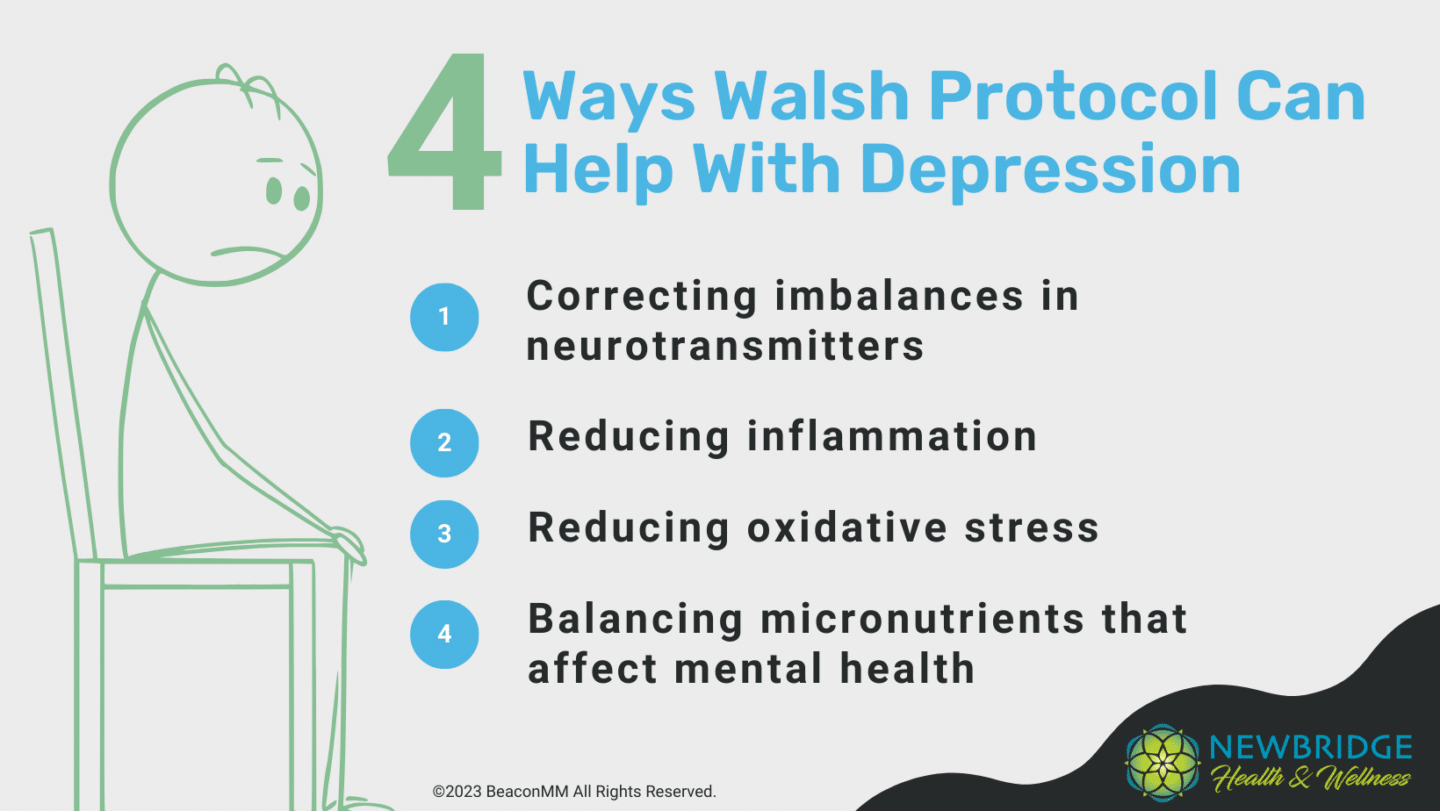As living organisms in the natural world, our biochemistry is intrinsic to the proper functioning of our minds, our bodies, and to our overall state of health and well-being. The simple fact is, our brains and bodies are influenced by all of the chemical reactions taking place within. And when these biochemical systems are out of balance, we feel the effects.
Nutrition is the foundation of health, and nutritional imbalances can cause the entire structure of our being to function improperly. But through the adjustment and modification of micronutrients within the body, one can potentially regain biochemical balance and begin living a full, healthy life.
The Walsh Protocol offers patients an option for coping with several ailments – predominantly depression and anxiety. For those who have mild to moderate symptoms of depression and do not wish to take medication for these illnesses, the Walsh Protocol may prove to be a great path forward to improving overall mental health.
Are you interested in a functional medicine approach to treating depression? Reach out to Newbridge Health & Wellness today and get matched with the right provider.
What is the Walsh Protocol?
According to Elizabeth Kirt, APRN, FNP-C, PMHNP-BC of Newbridge Health & Wellness, “The Walsh Protocol, at its core, is a personalized approach to care. And at Newbridge, as functional medicine providers, we look at all factors such as patient labs, diet, stress, personal life, and medical history when designing a Walsh Protocol treatment plan for each patient.”
At the basic level, the Walsh protocol is a nutrient therapy program that focuses on correcting imbalances in biochemical pathways in the body – developed by Dr. William J. Walsh, a scientist and researcher who has spent decades studying the link between nutrition and mental health. Dr. Walsh’s research has shown that imbalances in certain nutrients and chemicals in the body can contribute to depression and other mental health conditions.
As mentioned, Dr. Walsh’s protocol involves a series of lab tests that measure the levels of various nutrients and chemicals in the body. Based on the results of these tests, a personalized nutrient therapy plan is developed. This plan may involve supplementation with specific vitamins, minerals, and amino acids, as well as dietary changes.
“The Walsh Protocol basically looks at micronutrient imbalances and gives us clues as to how we can adjust those to suit better mental health. For example, in copper/ zinc balance, we often see a decrease in one or the other in some patients such as young women on birth control. We often see an increase in copper – especially with a copper IUD. And if we know we have a patient with high copper levels, adding more zinc – whether as a supplement or as a part of the diet – will often help to bring copper levels down and return balance to both, Kirt says.”
How Does the Walsh Protocol Help with Depression?

One of the key ways that the Walsh Protocol helps with depression is by correcting imbalances in neurotransmitters, which are chemicals in the brain that regulate mood. For example, low levels of serotonin, a neurotransmitter that is often referred to as the “feel-good” chemical, can contribute to depression. The Walsh protocol can help to increase serotonin levels by providing the body with the necessary nutrients to produce more of it.
Another way the Walsh protocol can help with depression is by reducing inflammation in the body. Inflammation is linked to a variety of health conditions, including depression. The Walsh protocol may also include anti-inflammatory supplements and dietary changes that can help to reduce inflammation levels in the body.
Finally, the Walsh protocol can also help to reduce oxidative stress, which is an imbalance between the production of free radicals and the body’s ability to neutralize them. Oxidative stress has been linked to depression, and the Walsh protocol can help to reduce it through the use of antioxidants.
While the Walsh protocol may not work for everyone with depression, it has shown promise in helping many people who have not responded well to traditional therapies. However, it is important to note that the Walsh protocol should only be undertaken under the guidance of a qualified healthcare practitioner who is trained in this approach.
Challenges & Success
All medical approaches to depression treatment come with a variety of challenges. But just as well, there are also many successful attempts at the treatment of depression. As such, patients may have challenges when implementing the Walsh Protocol for treatment. However, when a patient is wanting to reduce their dependence on medication, the Walsh Protocol can potentially be successful in this endeavor.
According to Kirt, “The Walsh protocol offers a holistic way to get people off of antidepressants and psychiatric medications. Oftentimes, it’s also appropriate for some patients to be taking these medications as long as they’re working well – but most psychiatric medications really aren’t designed for long-term use, at most for 9 to 12 months,” she explains.
Kirt also states, “Depending on the diagnosis, when we have patients who feel that their medications aren’t working well, we can implement the Walsh protocol to help get them off of medication at an incremental rate, by adjusting micronutrients to a stable balance.”
When it comes to challenges, compliance is the biggest challenge. For example, sometimes a patient doesn’t have the time to adhere to a specific regimen for taking supplements or pausing during the busyness of their day to even take a lunch break in order to get proper nutrition.
“If you think about it, our lives seem to get busier and busier every year as we take on more and more responsibilities, and when a patient is unable to adhere to their health regimen, this can present a challenge to their success with the Walsh Protocol,” Kirt offers.
Why the Walsh Protocol Works
When SSRIs were created, many people thought that simply increasing serotonin in the brain would make you feel better. However, medical professionals are now discovering that nobody is exactly sure how they work or why. In addition, the medical community is also learning that the gut actually contains more serotonin than the brain. As such, from a functional medicine standpoint, healing the gut can potentially make you feel better mentally, too.
In addition, low serotonin, dopamine, and norepinephrine are often related to depression. But many providers still don’t know exactly how these chemicals work. However, the Walsh protocol is essentially looking for micronutrient imbalances and gut imbalances, and making sure that the body is balanced and healthy. By this logic, if you consider the gut-brain connection when your body and gut are in good health, your brain is also going to work better.
When considering the Walsh Protocol, it’s worth noting that patients with moderate depression and anxiety may see the most success from this treatment whereas those that have chronic or severe depression may find that medication is the safest and most suitable method for managing symptoms.
For those who may be thinking of beginning treatment of depression with the Walsh Protocol, Kirt suggests that they read Dr. Walsh’s book before they jump right into it. Kirt further explains, “Remember that the Walsh Protocol isn’t the only option. And all patients should come in with an open mind and a willingness to understand that there are multiple areas that can be addressed at the same time with other treatments.”
Are you interested in exploring how the Walsh Protocol can help with treating depression? Contact Newbridge Health & Wellness today and schedule a consultation.


